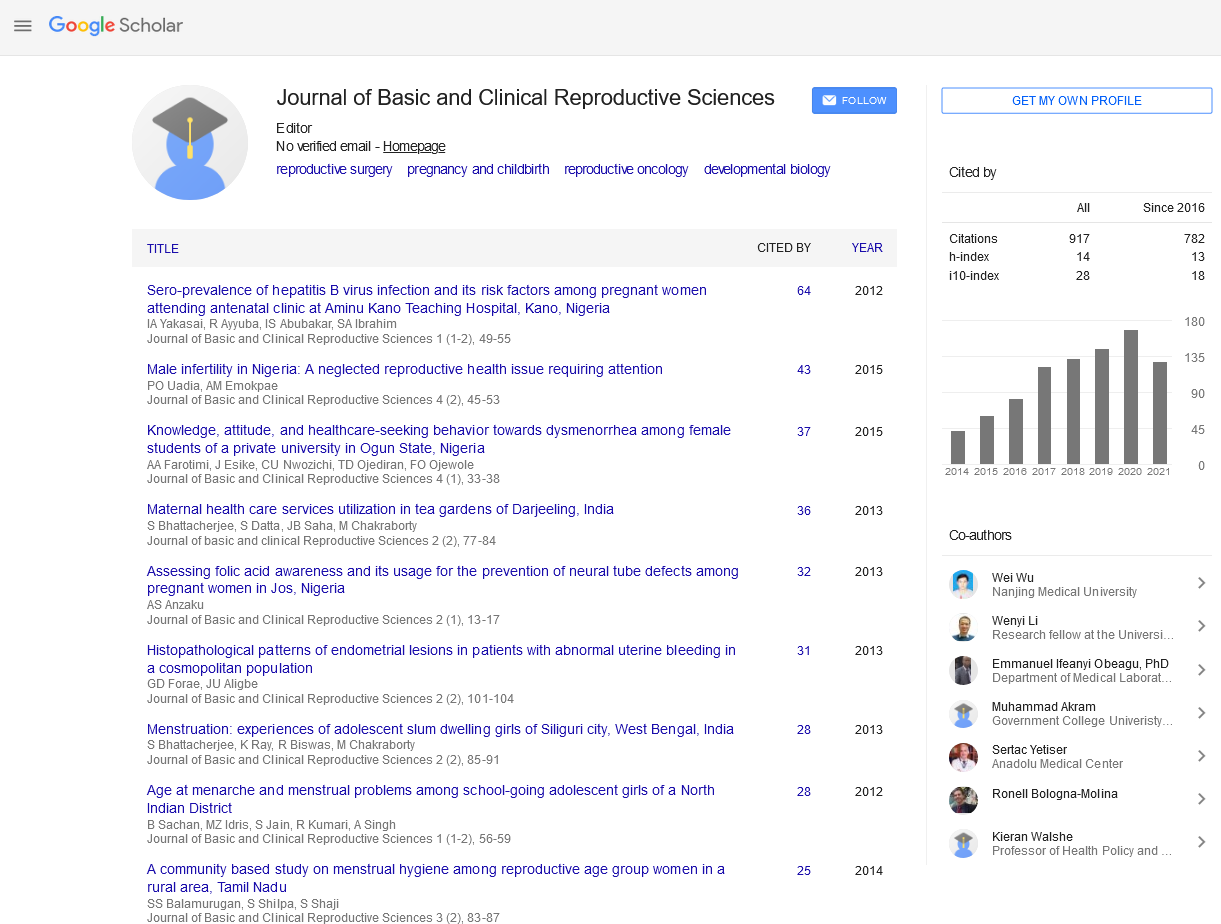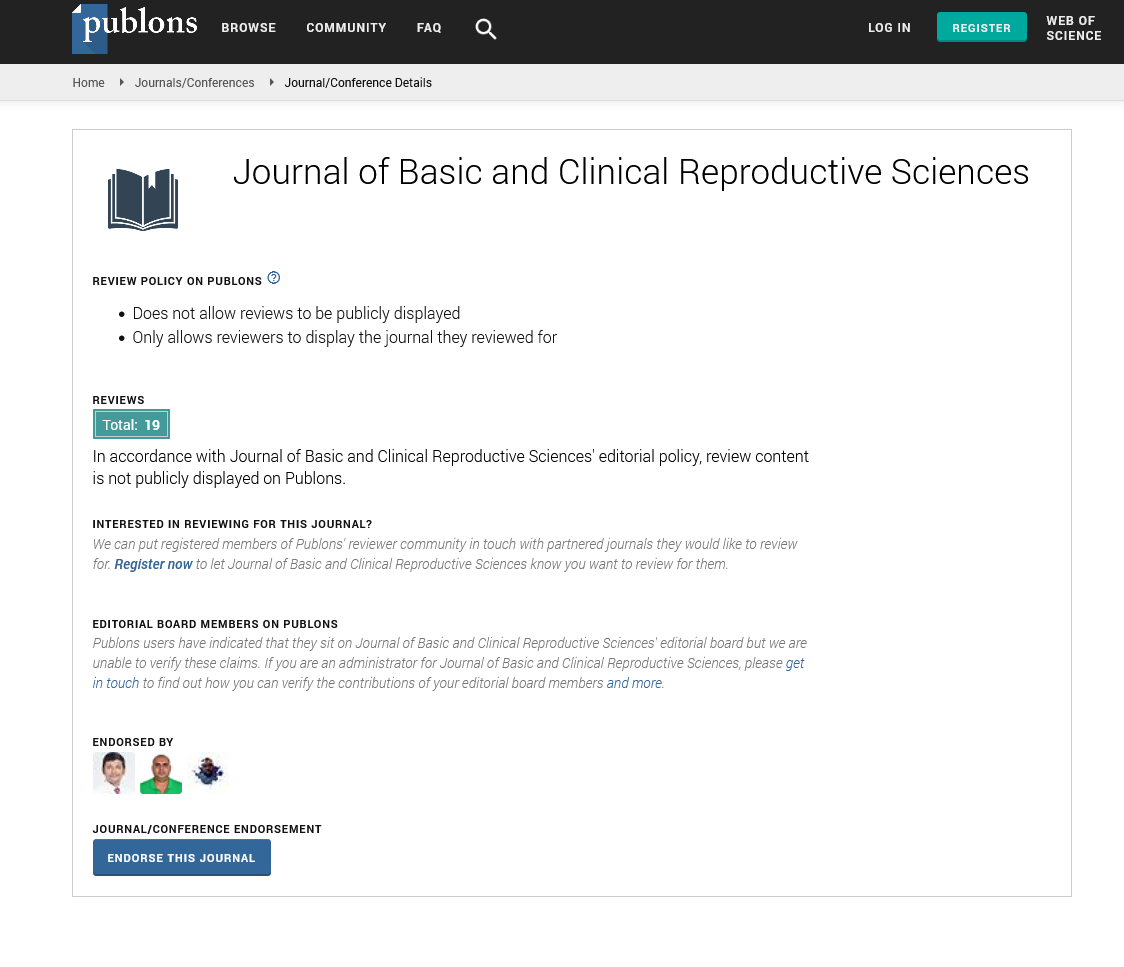Perspective - Journal of Basic and Clinical Reproductive Sciences (2023) Volume 12, Issue 5
Therapeutic Interventions and Diagnostic Advancements in Reproductive Oncology
Received: 25-Sep-2023, Manuscript No. JBCRS-23-121562 ; Editor assigned: 27-Sep-2023, Pre QC No. JBCRS-23-121562 (PQ); Reviewed: 11-Oct-2023 QC No. JBCRS-23-121562 ; Revised: 18-Oct-2023, Manuscript No. JBCRS-23-121562 (R); Published: 25-Oct-2023
This open-access article is distributed under the terms of the Creative Commons Attribution Non-Commercial License (CC BY-NC) (http://creativecommons.org/licenses/by-nc/4.0/), which permits reuse, distribution and reproduction of the article, provided that the original work is properly cited and the reuse is restricted to noncommercial purposes. For commercial reuse, contact reprints@pulsus.com
Description
Reproductive oncology, a dynamic and evolving field, stands at the crossroads of cancer care and fertility preservation. As advancements in cancer treatments continue to improve survival rates, the focus on preserving reproductive health has become integral to holistic patient care. The diagnosis and treatment of cancer often intersect with issues of fertility, posing unique challenges for individuals of reproductive age. This section delves into the intricate relationship between cancer and fertility, discussing the impact of cancer treatments on reproductive organs and the potential for fertility-related complications post-treatment. Recognizing this interplay is crucial for developing tailored approaches to address the dual concerns of cancer and fertility preservation.
Fertility preservation techniques
In the landscape of reproductive oncology, fertility preservation techniques have emerged as a beacon of hope for individuals facing cancer diagnoses. This section explores established methods such as cryopreservation of gametes (eggs and sperm) and embryos, as well as experimental options like ovarian tissue cryopreservation. Evaluating the efficacy, limitations, and evolving technologies in fertility preservation empowers healthcare professionals and patients to make informed decisions about their reproductive future. Navigating the complex terrain of reproductive choices amidst a cancer diagnosis requires comprehensive oncofertility counselling. This section emphasizes the role of healthcare providers in guiding individuals through the decision-making process, considering factors such as cancer type, treatment plan, and the urgency of treatment. Informed decision-making, coupled with emotional support, is integral to the well-being of patients facing the dual challenges of cancer and fertility preservation. While strides have been made in the field of reproductive oncology, challenges persist. This section addresses issues such as financial barriers to fertility preservation, disparities in access to reproductive healthcare, and the psychological impact of fertility-related decisions on cancer patients. Identifying and addressing these challenges is essential for advancing the field and ensuring equitable access to fertility preservation options.
Innovations in reproductive oncology
The landscape of reproductive oncology is marked by ongoing innovations aimed at improving fertility preservation outcomes. This section explores emerging technologies, including advancements in Artificial Reproductive Technologies (ART), the development of novel fertility preservation techniques, and the integration of precision medicine in tailoring fertility preservation strategies based on individual patient profiles. These innovations hold promise for enhancing the effectiveness and accessibility of fertility preservation in the context of cancer care. Beyond the immediate challenges of cancer treatment and fertility preservation, this section explores the long-term impact on quality of life and survivorship. Examining the psychosocial aspects, including the post-treatment fertility journey, psychological well-being, and the integration of survivorship care plans, contributes to a holistic understanding of the patient experience in reproductive oncology. The intersection of cancer and fertility preservation raises complex ethical considerations. This section delves into issues such as the prioritization of cancer treatment over fertility preservation, the ethical implications of experimental fertility preservation techniques, and the importance of patient autonomy in decision-making. Addressing these ethical dimensions is vital for ensuring patient-centered care in reproductive oncology.
Conclusion
In conclusion, reproductive oncology stands as a pivotal field that bridges the realms of cancer care and fertility preservation. This has traversed the interplay of cancer and fertility, fertility preservation techniques, oncofertility counselling, challenges, innovations, quality of life considerations, and ethical dimensions in reproductive oncology. By comprehensively addressing these aspects, we contribute to a nuanced understanding of the complex landscape faced by individuals navigating the intersection of cancer and fertility. As research and clinical practices continue to evolve, the field of reproductive oncology holds the potential to redefine the future of cancer survivorship with a renewed focus on preserving the reproductive health and choices of individuals facing cancer diagnoses.


